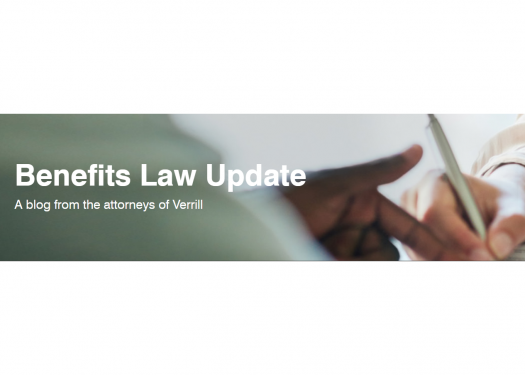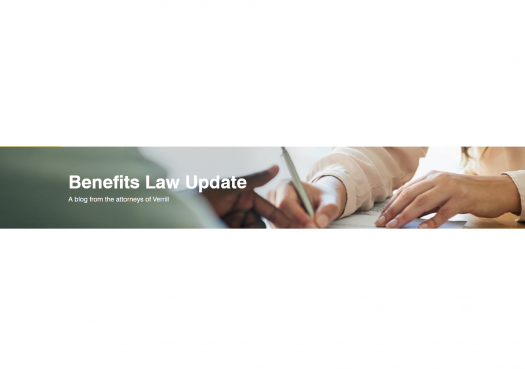Category: Plan Administration
Health and Welfare Benefit Plan Fiduciary Governance in the Wake of the Johnson & Johnson Lawsuit
For the past few years, we have encouraged plan sponsors to focus on matters of fiduciary governance for their health and welfare benefit plans ( see our 2021 blog post ). Yet many plan sponsors overlook the fact that the fiduciary standards of ERISA apply equally to retirement plans...
ACA Compliance When Employees Move from Full-Time to Part-Time Mid-Year
We are well into the Affordable Care Act (“ACA”) information reporting season. Forms 1095-B/1095-C must be provided to employees by March 1, 2024, and the deadline for electronic transmittal of Forms 1094-B/1094-C to the IRS is April 1, 2024. A common fact pattern that frequently results in ACA reporting...
Safe Harbor Exception for De Minimis Dollar Amount Reporting Errors
As part of the routine administration of employee benefit plans, shortly after the end of a calendar year, many transactions must be reported to the federal government (“information returns”) and participants (“payee statements”) using forms such as Forms W-2, 1099, 1094, and 1095. As benefits professionals know, errors can—and...
IRS Issues Practical Guidance for Implementing SECURE 2.0 Provisions
The Internal Revenue Service gave retirement plan sponsors end-of-the-year gifts by providing guidance under twelve sections of the SECURE 2.0 Act of 2022 (“SECURE 2.0”). Although Notice 2024-2, released December 20, 2023 (the “Notice”), expressly does not provide “comprehensive guidance,” it does address urgent, practical questions for the implementation...
SECURE 2.0 Provisions with 2024 Implementation Dates
This post summarizes provisions of SECURE 2.0 that retirement plans may need or want to implement for 2024. While no amendments are required for plans heading into 2024, plan operations may see some updates, especially if the plan sponsor wishes to implement some of the new optional features. We...
Proposed Regulations Regarding Long-Term, Part-Time Employees
Newly issued IRS Proposed Regulations regarding the special eligibility and vesting requirements for long-term, part-time employees provide guidance that 401(k) plan sponsors have been waiting for since these requirements were established under SECURE 1.0. Though it has been three years since SECURE 1.0 was enacted, the Proposed Regulations were...
Use of Retirement Plan Forfeitures: The IRS Proposed Regulations, Recent Litigation, and the DOL’s Position
In five recently filed class action lawsuits, [1] 401(k) plan participants allege that plan fiduciaries violated ERISA by using plan forfeitures to offset employer contributions instead of paying plan expenses. The use of forfeitures to offset employer contributions is a long-standing practice expressly approved by IRS proposed regulations issued...
Retiree Medical Coverage: Just Get the COBRA Waiver
The interaction between employer-provided retiree medical coverage and COBRA [1] is complex. Many employers incorrectly assume they do not have to offer COBRA at retirement if they offer a retiree medical plan or a retiree health reimbursement arrangement (HRA), but the calculus is not that simple. Whether there is...
Catch-Up Contributions: IRS Provides Relief from Roth Requirements of SECURE 2.0
On August 25, 2023, the IRS issued IRS Notice 2023-62 , providing much needed relief for employers who have been struggling to implement Section 603 of the SECURE 2.0 Act of 2022 (“SECURE 2.0”), which requires high income employees to make all catch-up contributions to 401(k), 403(b), or governmental...
DOL Continues Enforcement of Non-Quantitative Treatment Limitation Requirements
Introduction : Fifteen months ago, we wrote that the U.S. Department of Labor (“DOL”) had informed Congress that it intended to devote substantial resources to enforcing the new comparative analysis requirement for non-quantitative treatment limitations (“NQTLs”) required under the Mental Health Parity and Addiction Equity Act. (Read our blog...
How to Comply with the Health FSA Debit Card Claims Substantiation Rules
The IRS’s recent Chief Counsel Advice Memorandum 202317020 (the “Memo”) brings into focus the importance of compliance with the debit card claims substantiation requirements for medical care expenses reimbursed or paid for through a health flexible spending account (“health FSA”) offered under a cafeteria plan. [1] The risk of...
Establishing Practices and Procedures to Support Self-Correction of Operational Failures
The self-correction of retirement plan operational failures under IRS correction principles has been conditioned upon a plan sponsor’s establishment of compliance practices and procedures since the creation of the Employee Plans Compliance Resolution System (“EPCRS”) 25 years ago. This condition was articulated in IRS Revenue Procedure 98-22, which refined...
Reasonable Compensation Under ERISA: Thoughts on Two Recent Cases
Two recent court decisions bring into focus two seldom-asked questions about the reasonable compensation requirement under ERISA. When must an ERISA plan’s service provider compensation be reasonable? And why shouldn’t a plan fiduciary be able to receive reasonable compensation from the plan even if the fiduciary had a hand...
Gag Clauses – New Guidance and Litigation Will Inform Compliance
Certain provisions of the Transparency in Coverage Final Regulations and the Consolidated Appropriation Act, 2021 (“CAA”) require group health plans and/or their vendors to report information to federal agencies. On December 31, 2023, group health plans will have to provide an attestation concerning compliance with the prohibition on gag...
New Options for Retirement Plan Distributions Under SECURE 2.0
This post summarizes the new distribution options, including penalty-free withdrawals, applicable to defined contribution plans under the SECURE 2.0 Act of 2022 (“SECURE 2.0”) and provides a timeline of their effective dates. The new options further evidence Congress’s growing appetite for approving legislation that allows greater pre-retirement access to...
The End of the COVID-19 Emergency Declarations Raises Questions, but We’ve Got Answers
It seems the COVID-19 pandemic is ending in the benefits world the same way it started: in a flurry of new laws, announcements, and notices intended to offer clarity but sowing confusion. To begin, it is important to remember that COVID-19 triggered not one, but two federal emergency declarations...
Proposed Regulations on How to Use Forfeiture Accounts: Helpful Guidance and a Great Reminder to Plan Sponsors
On February 27, 2023, the IRS published proposed regulations on the use of forfeitures in qualified retirement plans. [1] For defined contribution plans, the regulations provide welcome clarity on what forfeitures can be used for and the date by which forfeitures must be used. In addition, they provide a...
Casting a Wider Net: SECURE 2.0 Gives “Long-Term Part-Time Employees” Faster Access to 401(k) Plans and 403(b) Plans
The SECURE 2.0 Act of 2022 (“SECURE 2.0”) promotes and expands access to retirement plans for American workers in several ways. Among other things, SECURE 2.0 strengthens and expands the special 401(k) plan eligibility requirements for long-term part-time workers established by the Setting Every Community Up for Retirement Enhancement...
401(k) Plan Matching Contributions: To True Up or Not True Up?
As a matter of plan design, for purposes of matching contributions some 401(k) plans provide that a participant’s compensation for the entire plan year is taken into account (regardless of whether the participant makes elective deferrals with respect to each payroll period during the year), while other 401(k) plans...
2025 Is the New 2022: IRS Extends Deadline to Adopt SECURE Act Amendments and CARES Act Waiver of 2020 RMDs Amendment
This post was updated on September 27, 2022. On August 3, 2022, the IRS released Notice 2022-33 , which extends the deadline for plans to adopt: all SECURE Act [1] amendments, optional or required (a summary of SECURE Act changes can be found here ); CARES Act [2] amendments...
How to Shoot Yourself in the Foot with Your SPD
Benefit plan sponsors sometimes send out Summary Plan Descriptions (SPDs) having given too little thought to the legal consequences. Two recent cases illustrate how an organization can end up in serious and costly litigation based on statements that did not have to be made in SPDs that did not...
Required Minimum Distributions and Missing Plan Participants

In January of 2021, we published two blog posts regarding Department of Labor (“DOL”) guidance on missing retirement plan participants. The first post describes DOL guidance on best practices for locating missing retirement plan participants. The second post describes the DOL’s Terminated Vested Participants Project (“TVPP”), which was initiated...
Thoughts on the DOL’s Proposed ESG Regulation

The latest installment in the regulatory back-and-forth over the investment of ERISA-governed retirement plan assets based on environmental, social, and corporate governance (“ESG”) factors arrived on October 14, 2021 in the form of a newly proposed regulation on “ Prudence and Loyalty in Selecting Plan Investments and Exercising Shareholder...
Self-Insured Group Health Plan Sponsors: Action Steps to Mitigate Risk Under the Mental Health Parity and Addiction Equity Act
The Mental Health Parity and Addiction Equity Act (“MHPAEA”) provisions of the Consolidated Appropriations Act, 2021 (“CAA”) introduced a requirement that group health plans and insurance providers offering both medical and surgical benefits (“M/S benefits”) and mental health and substance use disorder benefits (“MH/SUD benefits”) that impose non-quantitative treatment...
Revenue Procedure 2021-30: A New and (Further) Improved EPCRS
The Internal Revenue Service has updated the Employee Plans Compliance Resolution System (EPCRS) in several respects that will be helpful to retirement plan sponsors. Revenue Procedure 2021-30 , published July 16, 2021, replaces the previous version ( Rev. Proc. 2019-19 ) in its entirety. Most provisions of the new...
Retirement Plan Administrators: Are You Ready to Comply with the New Lifetime Income Disclosure Requirement for Benefit Statements?
Lifetime Income Disclosure Requirement . The Setting Every Community Up for Retirement Enhancement Act of 2019 (the “SECURE Act”), enacted December 20, 2019, added a new annual disclosure requirement for benefit statements to participants and beneficiaries. The new disclosure requirement applies to all ERISA-covered defined contribution plans ( e.g...
Employee Benefits & Executive Compensation 2021 Summer Client Advisory
Click here to view as a PDF. This Client Advisory summarizes developments in the law governing employee benefit plans prompted by the COVID-19 pandemic. We explain what these developments mean for plan sponsors and highlight the need to adopt plan amendments within limited time periods in order to fully...
Do You Understand Your Investment Policy Statement?
The Acme Rocket Sled Company Retirement Plan Administration Committee recently selected a new investment advisor for the company’s 401(k) plan. During the RFP process, the new advisor observed that the Investment Policy Statement (IPS) that the committee adopted many years ago was a bit thin and out of date...
Supreme Court will Hear Northwestern University 403(b) Plan Excessive Fee Case
The United States Supreme Court will weigh in on the spate of recent lawsuits filed against colleges and universities related to the schools’ retirement plans. The Court has granted a request for review from participants in two 403(b) retirement plans sponsored by Northwestern University. The participants seek to overturn...
Primer on Severance Plans Under ERISA and the Tax Code
Many employers maintain formal or informal severance policies or practices that they use sporadically. Other employers may implement a severance program for a limited period of time to reduce the number of employees overall or within a work classification or location. All employers should be mindful that these policies...
Page 1 of 5









